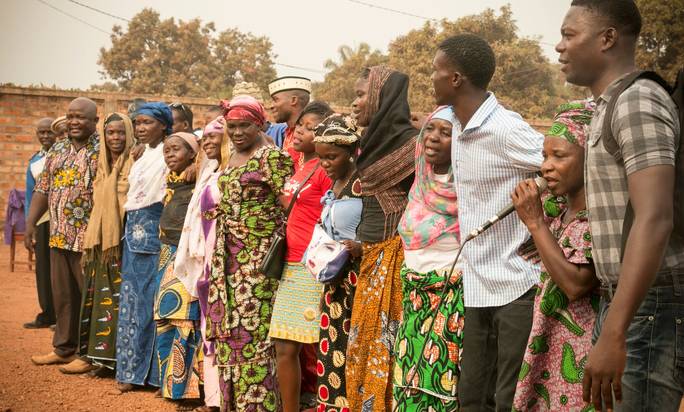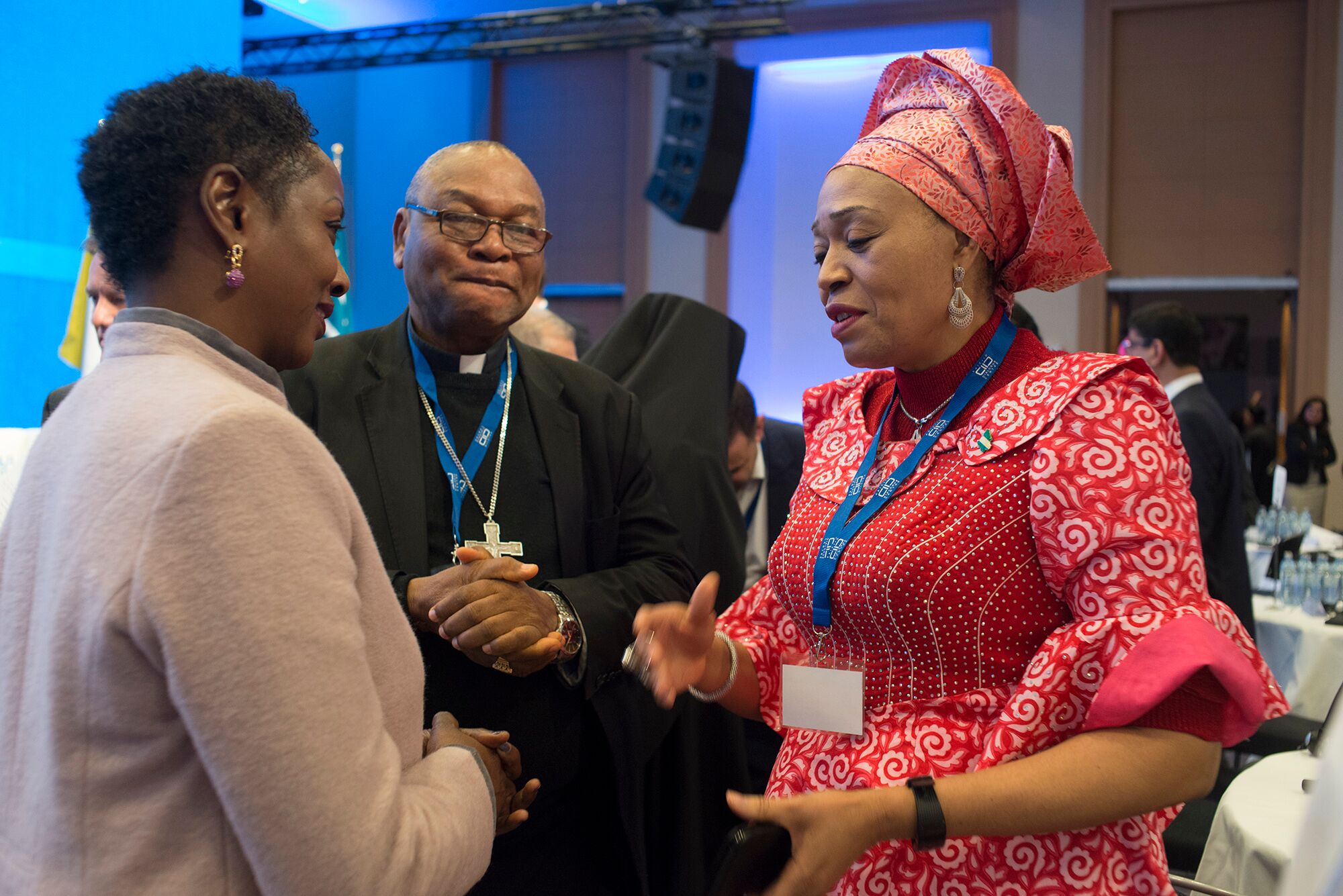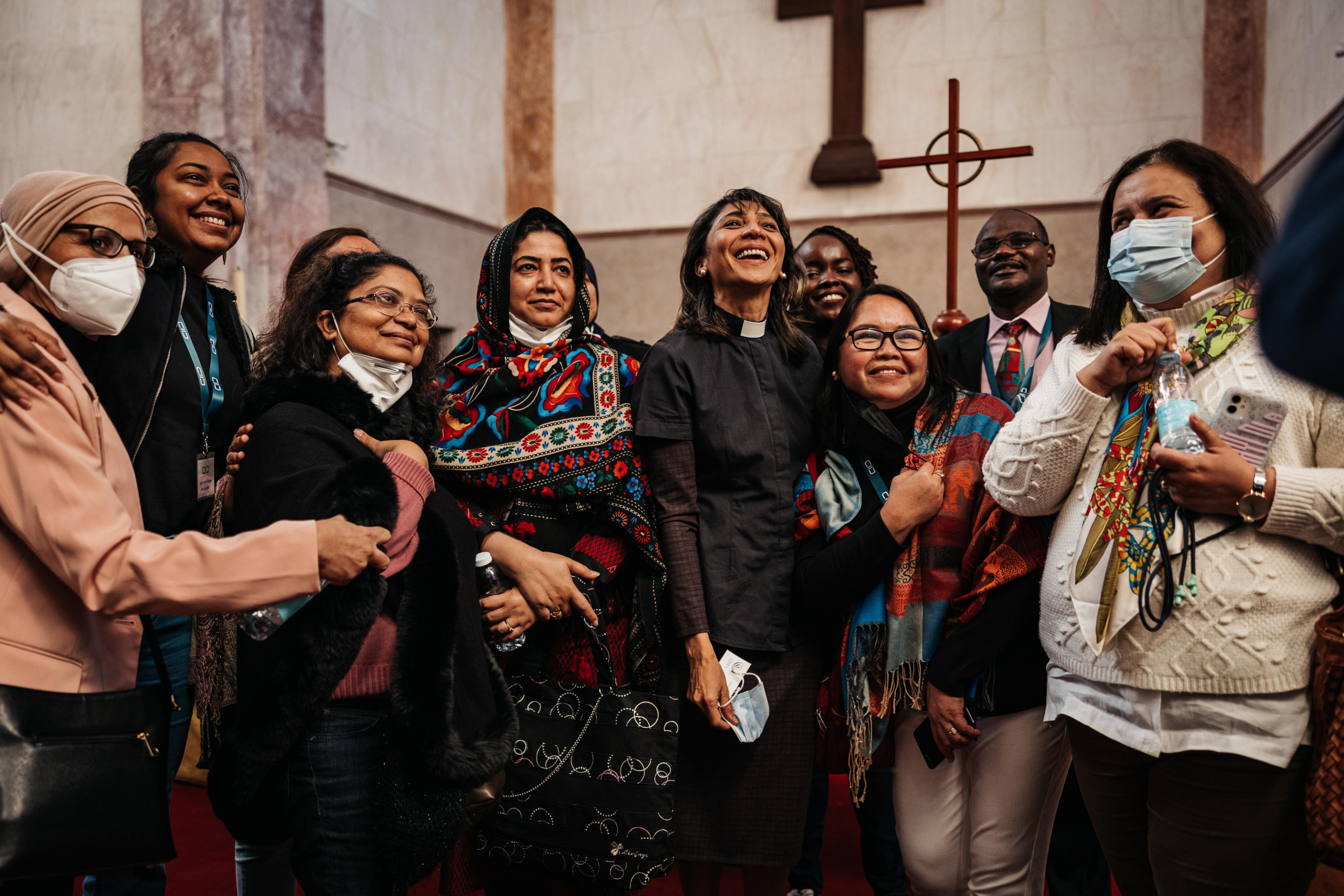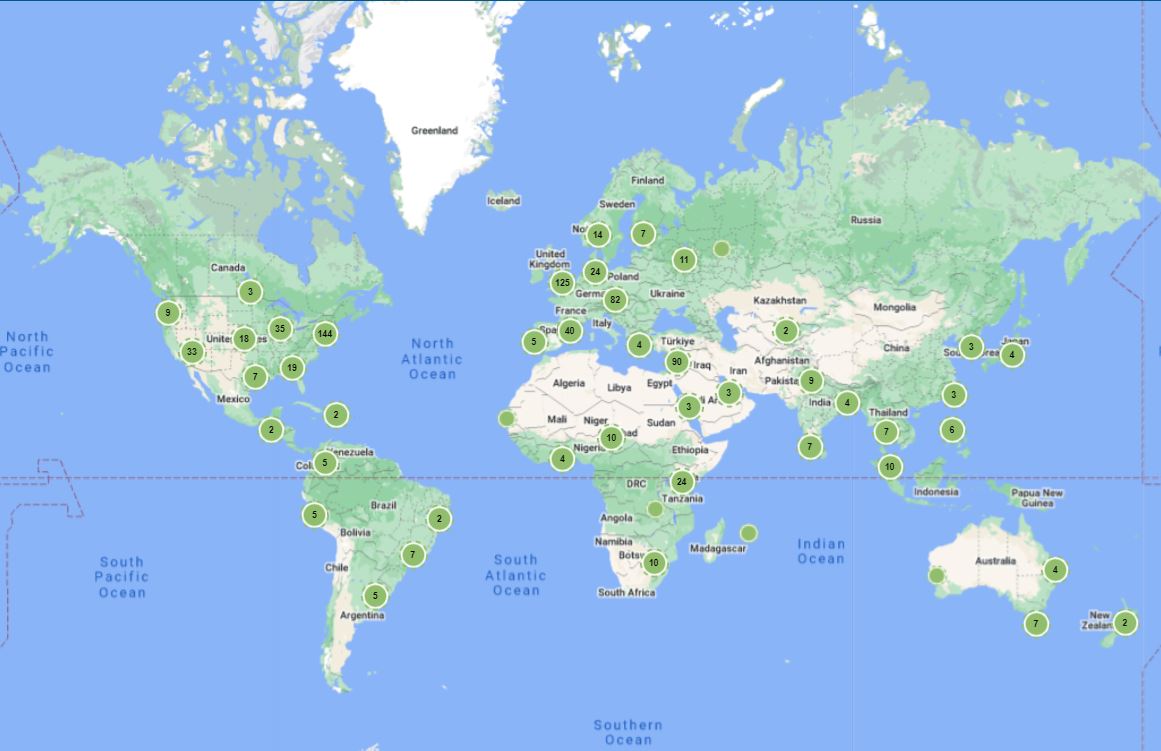Promising Practices
Promising Practices is a collation and expansion of existing documentation on promising practices in interreligious dialogue. Our database offers guidelines and focuses on the concrete implementation of interreligious and intercultural dialogue practices around the world.

Disclaimer:
Through providing different aspects and ideas our aim is to compliment the great work that has been already done in the field of Interreligious and Intercultural Dialogue. Information and field data published in this resource are for informational purposes only, and neither KAICIID nor the Dialogue Knowledge Hub guarantee in any way success of the implementation of the activity.
While we wish all the activities and initiatives featured in this resource could be replicable in as many context around the world as possible, there are often certain limitations, such as the suitability for particular cultures or religious communities. However, there is always room to explore and adjust activities in regards to the community’s environment.
- Global
- New Zealand
- UK
- Advocacy
- Confessional / Religious / Spiritual Activities
- Democracy
- Environment
- Freedom of Expression
- Human Security
- Intercultural Dialogue
- Interreligious Dialogue
- Intrareligious Dialogue
- Peace
- Pluralism
- Shared Human Values
- Social Cohesion & Citizenship
- Social Work & Community Service
- Multireligious
- None
Social Leadership
“Active Citizens” is a social leadership programme launched by the British Council that promotes intercultural dialogue and social responsibility around the world. Through its programme, Active Citizens brings together people with different beliefs and perspectives to learn from and share their experiences with each other. They train participants in the skills and knowledge needed to affect social change in their communities.
- Mexico
- Morocco
- Advocacy
- Capacity Building & Empowerment
- Democracy
- Freedom of Expression
- Freedom of Religion and Belief
- Information Distribution
- Intercultural Dialogue
- Interreligious Dialogue
- Networking
- Peace
- Pluralism
- Shared Human Values
- Social Cohesion & Citizenship
- Women's Rights
- Islam
- Judaism
- Multireligious
Women Empowerment
Women are vital actors of society, and must be empowered to foster equality, dialogue, and peaceful coexistence. Women empowerment can take the shape of different practices and activities such as exhibitions or workshops. Exhibitions of women’s portraits can transcend religious differences, and empower women to share their narratives and experiences through pictures, thus focusing on the vital role they play in their communities. Exhibitions can be organized as a one-time event where it is initially organized, or can become a traveling exhibition, either within the initial country or from one country to another.
Moreover, in the religious sphere, women rarely have a leading role. The initiative “Women of Faith” gives women the opportunity to shine and lead in spaces where they are often marginalized. This initiative wishes to empower women to share their experiences and their perception on what their role is in modern religious communities.
- Guatemala
- Advocacy
- Democracy
- Freedom of Expression
- Freedom of Religion and Belief
- Information Distribution
- Intercultural Dialogue
- Interreligious Dialogue
- Networking
- Peace
- Pluralism
- Shared Human Values
- Social Cohesion & Citizenship
- Multireligious
Interfaith Radio
This practice is excellent for individuals or organizations working in a radio station or who wish to launch their own. “Radio for Peace” is an inclusive model of a radio channel that addresses social issues and matters of cohesion between different interreligious or intercultural groups, such as indigenous and non-indigenous people. The radio can focus on different topics such as interfaith, intercultural or intergenerational problems in society.
- Brazil
- Japan
- Educational Programmes
- Freedom of Religion and Belief
- Intercultural Dialogue
- Interreligious Dialogue
- Intrareligious Dialogue
- Peace
- Pluralism
- Indigenous
- Indigenous Traditions
- Multireligious
Interfaith Music
Music transcends differences and offers an opportunity for people to unite around enjoyable activities, thus it fosters interfaith coexistence. Individuals can participate in a variety of activities which range from singing karaoke to building drums. The purpose behind these activities is to bring together individuals from different religious backgrounds to engage in interreligious dialogue while participating in an entertaining activity.
- Laos
- Peru
- Tanzania
- Advocacy
- Capacity Building & Empowerment
- Confessional / Religious / Spiritual Activities
- Democracy
- Educational Programmes
- Freedom of Expression
- Freedom of Religion and Belief
- HIV
- Human Security
- Intercultural Dialogue
- Interreligious Dialogue
- Intrareligious Dialogue
- Networking
- Peace
- Pluralism
- Shared Human Values
- Social Cohesion & Citizenship
- Social Work & Community Service
- Women's Rights
- Youth
- Buddhism
- Multireligious
Interfaith Support for HIV Patients
People affected by HIV have to face prejudice and stereotypes and tend to be isolated from the community, especially in religious contexts. Interfaith communities can be mobilized to unite and tackle the issue of HIV, and support patients, therefore including them in their communities, breaking stereotypes, and fostering coexistence. Different religious communities or interfaith groups can work on a solidarity program with a specialized organization, to show solidarity with affected patients.
Support for HIV patients can take the form of a video project that breaks stereotypes around those the virus. It shows people of different backgrounds dealing with the virus, their hardships and the social pain they go through. Sharing different narratives proves how anyone can be affected by HIV and challenges the stigma around it.
A theatre group can also engage people of different religious backgrounds and affected by HIV to raise awareness of their reality through theatre. The aim is to raise awareness of HIV within religious communities, to create safe spaces for affected individuals.
- Guatemala
- Rwanda
- South Africa
- Sri Lanka
- Advocacy
- Capacity Building & Empowerment
- Confessional / Religious / Spiritual Activities
- Democracy
- Diplomacy
- Educational Programmes
- Freedom of Religion and Belief
- Human Security
- Humanitarian Aid
- Intercultural Dialogue
- Interreligious Dialogue
- Intrareligious Dialogue
- Networking
- Peace
- Pluralism
- Shared Human Values
- Social Cohesion & Citizenship
- Social Work & Community Service
- Youth
- Buddhism
- Islam
- Multireligious
Interfaith Conflict Mediation
Interfaith conflict mediation can take different forms, from democratic empowerment in post-conflict environments, to material exchanges and dialogue to reconcile. When a conflict arises between two protagonists that have cultural and religious differences, mediation has to be fair and objective; it should not favor one over the other. Intercultural Conflict mediation ensures that each perspective and belief are taken into account in the mediation process.
The Interfaith Democratic Empowerment is a program put in place by the religious leaders of a given country. They organize constitution reading workshops, debates, give their communities the judicial and advocacy tools to be active citizens in democracy building.
Interfaith material exchanges help establish a dialogue when it is hard for people to have verbal interactions with one another. Different religious communities can decide to work on a solidarity program with a specialized organization. These programs can take place through the year in villages or cities of religious communities or interfaith groups, to show that solidarity is a common value shared by all.
“Religions to Reconcile” uses religion as a means to reconcile and unite people. This initiative implements reconciliation in environments or countries where religious identities often oppose each other and engage in conflict, thus engages them to come together and build a better society.
- Global
- Madagascar
- USA
- Confessional / Religious / Spiritual Activities
- Democracy
- Intercultural Dialogue
- Interreligious Dialogue
- Intrareligious Dialogue
- Pluralism
- Social Cohesion & Citizenship
- Youth
- Multireligious
Interfaith Social Media
Social Media has become a great tool to initiate dialogue, foster peaceful coexistence, and address societal issues and values. This practice can be established through different activities such as a social media campaign that encourages local residents to interview each other and to talk about their faith through video stories. The results are shared on an online repository that captures the diversity of local voices and serves as a model for other local campaigns in cities and on campuses across the country.
Another platform that would foster interfaith dialogue are blogs. The InterFaith Blog encapsulates stories of interfaith experiences from different perspectives and is run by people from different cultural and religious backgrounds. This initiative uses social media to promote active coexistence, share stories of peace and friendship, and raise awareness on mutual understanding and respect.
- Argentina
- Bosnia and Herzegovina
- USA
- Advocacy
- Confessional / Religious / Spiritual Activities
- Educational Programmes
- Freedom of Expression
- Freedom of Religion and Belief
- Interreligious Dialogue
- Intrareligious Dialogue
- Networking
- Peace
- Pluralism
- Social Cohesion & Citizenship
- Youth
- Multireligious
Peacewalk
Peacewalks are an interreligious practice that can be carried out in different manners. For instance, visiting tours can be organized to take people to different places of worship in different areas of a city. This provides an opportunity for people to learn about their neighbour’s religions. They can also make public statements on their commitment to peace and reconciliation. Another practice involves organizing a march on the remembrance day of a massacre, war, or genocide, therefore retracing the principal steps of history, and uniting people from all points of view to promote unity and reconciliation. It is a way to honour survivors or victims’ families and their memory, and an opportunity for perpetrators to apologize.
- New Zealand
- Tanzania
- USA
- Advocacy
- Confessional / Religious / Spiritual Activities
- Democracy
- Educational Programmes
- Environment
- Human Security
- Humanitarian Aid
- Information Distribution
- Intercultural Dialogue
- Interreligious Dialogue
- Minority Rights
- Networking
- Peace
- Shared Human Values
- Social Cohesion & Citizenship
- Social Work & Community Service
- Youth
- Atheism
- Christianity
- Islam
- Multireligious
Meal Sharing
Food is an easy way to foster interfaith dialogue and peaceful coexistence, since it breaks down boundaries between communities and people.
Individuals open their homes to share dinner with 8-12 people from diverse religious backgrounds. During dinner, a trained facilitator leads the discussion and participants are invited to actively listen and share stories. A judgment free zone, these individuals are not expected to be experts in their religious tradition. Another similar practice involves people of different faiths getting together for dinner to welcome refugees in their country and community. Furthermore, people of different backgrounds can also be encouraged to share their dinner with people in need of shelter. Backed by their respective religious teachings, the interfaith group gathers to give assistance to the deprived, which is a value shared by many religions.
Sharing food can also be implemented in a yearly tradition. The Interfaith Food Day is a day in the year to discover diversity within a school or a workplace through food and traditional dishes. This initiative can be carried out for students to take pride in their development in a diverse and international environment while fully embracing their own identity.
- Lebanon
- New Zealand
- South Africa
- Turkey
- USA
- Capacity Building & Empowerment
- Confessional / Religious / Spiritual Activities
- Educational Programmes
- Freedom of Expression
- Freedom of Religion and Belief
- Interreligious Dialogue
- Intrareligious Dialogue
- Minority Rights
- Peace
- Pluralism
- Youth
- Christianity
- Islam
- Judaism
- Multireligious
Interreligious Course
Interreligious courses are an effective method to foster interfaith dialogue, as they educate. Different projects and pathways can be used to establish curricula and courses on interfaith coexistence, such as a national interfaith civic education. This can be formulated and organized by an interfaith organization that works closely with the education ministry of a given country to implement it. Through this unified national education curriculum, the youth are taught about understanding and accepting others’ beliefs, and that their citizenship entails a respect for all people regardless of their faith. Another project involves offering a year-long University course on interreligious issues, after which participants are awarded a diploma of interreligious affairs. The goal behind such a course is to inform students about our multi-religious world. This can be implemented in primary schools as well, through basic instructions on different belief systems and practices of their respective countries’ religions. Outside the school context, an educational activity can be conducted in parishes to bring together children of different traditions, such as Jewish and Christian faiths, on weekends to learn about the teachings of both religions. Other programmes and projects can offer a set of classes to learn about the history, development and contemporary practices of the world’s major religions. Such a program is designed for individuals seeking additional and informal education, and willing to participate in evening classes scheduled after work or university.




